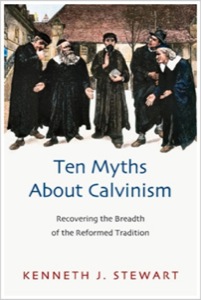 The New Calvinism is a hot issue in the world today, and especially in evangelicalism. It’s big for those who are Calvinists and it’s galvanizing for many who aren’t.
The New Calvinism is a hot issue in the world today, and especially in evangelicalism. It’s big for those who are Calvinists and it’s galvanizing for many who aren’t.
Many opponents view Calvinism as anti-evangelism and ant-missions and many proponents view those on the the other side of the debate with something akin to disdain. In this melee, brotherly love and humility often seem to be lacking on both sides of the argument. For some time now, I’ve been convinced that there needs to be apologies on both sides of the debate. Many Calvinists need to apologize for behaving in a way that could easily be seen as arrogant (often because they are indeed arrogant) in their reformed position. Many on the other side of the debate need to apologize for creating and destroying straw men of hyper-Calvinism without significant evidence to back up their position.
As I’ve considered the apologies I believe are necessary, I’m thankful for Kenneth Stewart’s new book, Ten Myths About Calvinism because Stewart addresses issues that both Calvinists and non-Calvinists need to deal with. He divides the book into two sections, the first of which is titled Four Myths Calvinists Should Not Be Circulating (But Are). Here he lists myths such as the myth that the Reformed position can be completely summed up in the person of John Calvin. He argues that Calvin’s view of predestination is not the only reformed position historically. He shows that TULIP has been the yardstick of the Reformed for only a short time (the earliest usage is around 1913). Lastly, he shows evidence that Calvinists have not historically held a dim view of revival, but that many in the reformed tradition (think Jonathan Edwards for instance) have been strong advocates of revival.
In the second part of the book, Stewart writes about Six Myths Non-Calvinists Should Not Be Circulating (But Are). In this section, Steward argues that Calvinism is not antimissionary, that Calvinism does not promote antinomianism, and that it does not lead to theocracy. He also shows that Calvinism does not undermine the arts, does elevate the role of women, and has worked (though with many faults) in many ways to bring about racial reconciliation.
He does a great job of showing that there are faults and misunderstandings on both sides of this great debate and that people on both sides need to repent. He shows in this book that the tent of the reformation is much wider than Calvin and that one’s views on predestination does not necessarily exclude one from the reformed theology camp. Even those who reject limited atonement and unconditional election are still shaped by the views of the reformers in many ways. Stewart closes the book with words of wisdom for all in the reformed camp.
We should be more ready to recognize that this movement is broader than our little corner of it and bigger than the circle we feel most comfortable in. We need fewer angular, sharp=elbowed Calvinists who glory in what distingusiehs their stance from that of others and a lot more supporters of the Reformed faith who rejoice in what they hold in common with others. When versions of Calvinism contend with one another over which is most authentic, we have sunk to a much lower level than that of the sixteenth century when the Swiss reformers and their international allies aimed at the broadest possible collaboration and widest possible mutual recognition. Calvin, after all, insisted he would if necessary “cross ten seas” if he could promote agreement in the central doctrines of the faith with fellow believers.
In the end, it seems that Stewart’s conclusion is this: the gospel must be primary. Stewart is right. Before we split hairs over our differences, let’s unite around the gospel and work to see the kingdom move forward. I’m thankful for this work.


PFP:
Thanks for this empathetic notice about my book. I find it interesting that you, like others in the SBC, see that the book holds potential for ‘dialing back’ some rhetoric in your circles. So be it! Some other reviewers have taken the book to be a caution to the ‘New Calvinist’ movement. Here, as in the case of the SBC, I would have to say that it wasn’t really my intention.
My own self-conscious aim was to address tensions and polarizations that exist within today’s Calvinist movement, tensions rooted both in 1)our too often harping on the wrong things (eg TULIP) and 2) on our not taking with sufficient seriousness fears and objections raised against the Reformed theological tradition by people who are not ‘cranks’, but simply unconvinced. If the book has wider uses (and I am growing in the hope that it does) so much the better.
Ken Stewart
Ken, thank you for your input here. Great book!
Pingback: Passion For Preaching » Blog Archive » Interview With Ken Stewart